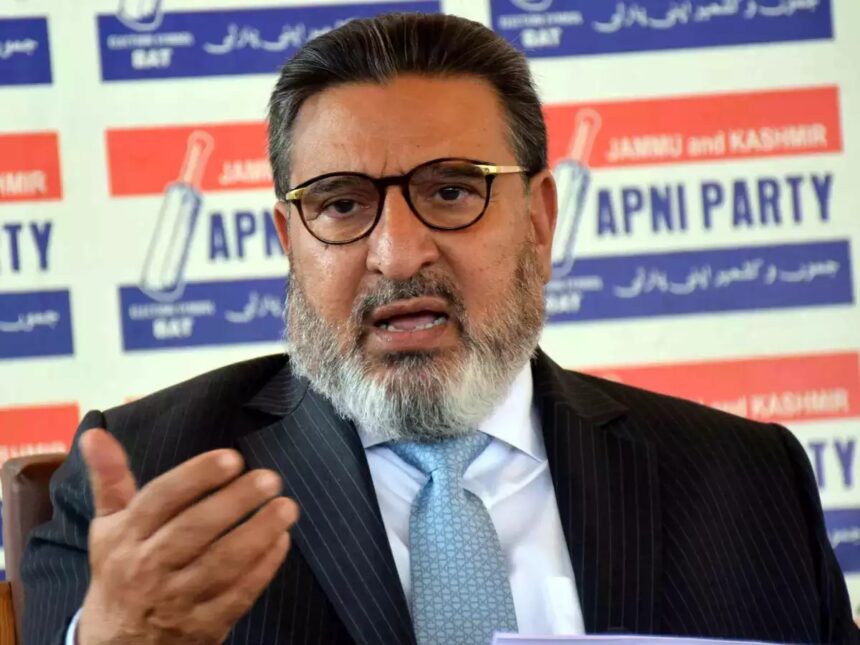J&K Elections: How Anti-Delhi Rhetoric Shapes Kashmiri Political Survival Amidst Poll Battles

Aakib Ahmad, TwoCircles.net
Srinagar: In April this year, Syed Altaf Bukhari, a prominent Kashmiri politician, openly aligned himself with Prime Minister Narendra Modi, asserting that supporting the central government was beneficial if it brought development and stability to the region.
Bukhari, who leads the newly formed political outfit Jammu and Kashmir Apni Party (JKAP), faced significant backlash from rival political parties for his closeness to New Delhi. At that time, the former minister of the erstwhile state was confident that his party would make a strong showing in the Lok Sabha elections. However, the results on June 4 revealed unforeseen challenges and setbacks, as JKAP candidates performed poorly, with many losing their security deposits.
“The opposition parties took advantage of this narrative and we suffered losses,” said Rafi Ahmad Mir, JKAP general secretary.
On August 5, 2019, the Bharatiya Janata Party (BJP)-led Union government revoked Article 370 of the Constitution, which had granted significant autonomy to Jammu and Kashmir. The state was then divided into two union territories —Jammu and Kashmir and Ladakh.
Political leaders close to the Centre for decades were detained for months — a move they had never anticipated. Three former chief ministers were booked under the Public Safety Act (PSA).
Since then, the political landscape has shifted dramatically. Regional politicians have increasingly relied on anti-New Delhi rhetoric for their survival, positioning themselves as victims of Delhi in the ongoing assembly elections.
In the first week of September, when the Election Commission of India (ECI) announced elections after a 10-year hiatus, this anti-Delhi narrative gained further traction, influencing campaign strategies and shaping voter sentiments across the region.
Almost all political parties, except the BJP, have pledged to restore statehood and the region’s special status in their manifestos — a promise that political analysts consider difficult to achieve. Their manifestos also include discussions on dialogue with Pakistan while maintaining a strong anti-Centre stance.
Interestingly, new political parties that emerged after the abrogation of Article 370, despite being labeled as ‘BJP proxies’, also advocate for the restoration of Article 370.
“The regional parties are fully aware that the abrogation of Article 370 can’t be undone, but they are still making promises as it will help them get votes,” said Dr. Suheel Rasool Mir, a political analyst based in Kashmir.
He further noted that instead of focusing on substantive issues, regional parties are engaged in a war of narratives with each other, further alienating the masses and particularly the youth.
On September 11, firebrand Kashmiri politician Sheikh Abdul Rashid, also known as Engineer Rashid, was released on interim bail from Tihar Jail after spending over five years in a terror-funding case. Rashid reverted to anti-Delhi rhetoric, attacking the BJP-led government for its alleged “anti-Kashmir” policies.
Rashid is known for his strong anti-Centre stance, which has been central to his political career. Addressing a rally in South Kashmir’s Anantnag district, he declared that they would never accept the changes imposed by New Delhi on August 5, 2019. Raising the slogan “Lakhanpur se Gilgit Tak, Sara Kashmir Hamara Hai (from Lakhanpur to Gilgit, every part of Kashmir is ours),” he criticised the central government’s policies.
Political observers argue that this narrative resonates in Kashmir similarly to how right-wing parties in mainland India capitalise on anti-Muslim rhetoric.
“Otherwise, what is there to sell?” said a political analyst from Kashmir, who wished to remain anonymous.
Aga Ruhullah Mehdi, a Member of Parliament from Central Kashmir, recently told reporters that his party, the National Conference (NC), will not “dig its own grave” by forming an alliance with the BJP.
“If, God forbid, the NC forms an alliance with the BJP after the elections, I will stand with the people,” Mehdi, who is also a prominent Shia leader, said during an election campaign in South Kashmir’s Pulwama.
While the BJP has made notable inroads in the Valley, it has yet to win over a significant portion of the population, as skepticism about its intentions and policies remains strong.
Sensing that the pro-New Delhi and pro-BJP narrative would not resonate well in the Valley, Bukhari distanced himself from the BJP ahead of the elections and began adopting his rivals’ strategies. In an interview with a news channel, he asserted that his party had no affiliation with the BJP and had not sought their help in the Lok Sabha elections.
“I was never the face of the BJP; I have never been with the BJP; and I will never be with the BJP,” he declared.
